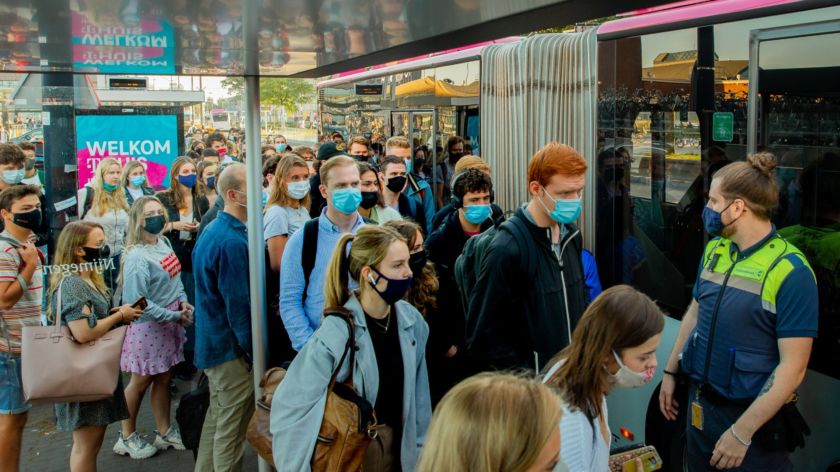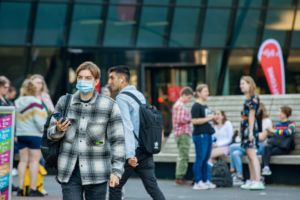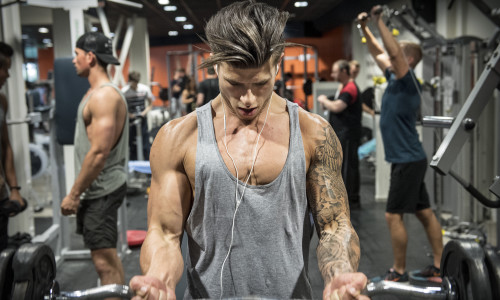Surgical masks in the lecture hall: ‘Higher education shouldn’t become the driving force behind the pandemic’
-
 Students on their way to campus, September 2021. (Not all students are wearing surgical masks). Photo: David van Haren
Students on their way to campus, September 2021. (Not all students are wearing surgical masks). Photo: David van Haren
If higher education reopens soon, students will need to wear surgical masks. Even while seated, as advised by the Outbreak Management Team. Doctor and microbiologist Andreas Voss explains why.
Places, where people from separate households converge, will require a surgical facemask to be worn from now on. This also includes students during lectures and physical exams, as stated in the draft advice that was handed to the cabinet by the Outbreak Management Team (OMT) last Monday. This Friday the cabinet will decide whether to follow this advice.
Extension of the facemask policy
‘The delta and other variants didn’t require this precaution, but omicron is much more contagious’, says OMT-member Andreas Voss, doctor and microbiologist at the CWZ (hospital in Nijmegen) and the RadboudUMC. ‘That is why the decision to extend the mask policy was made. It not only matters where the mask is worn, but its quality matters as well.’
Surgical facemasks have a higher filter capacity and were, until now, mostly worn in hospitals. ‘Most of the non-surgical facemasks have a lower rate of protection. That is why we prefer surgical facemasks with guaranteed quality.’
Can higher education reopen with these medical facemasks?
‘Everyone has realised that higher education will have to reopen sooner rather than later. But we also need to realise students are part of the age group where the spread of omicron is largest in absolute numbers. Higher education shouldn’t become the driving force behind the pandemic.’
‘Students need some perspective’
‘At the same time, students need some perspective. Medical facemasks can help, but I can’t say anything about plans for reopening.’
What else can higher education do to reopen?
‘Think about the way they want to implement physical education. Lectures with large groups should remain online, and tutorials with fixed participants should – while keeping distance and with good ventilation – be held physically. I can imagine students miss the physical connection with friends and colleagues more than the mass gathering of hundreds of people during a lecture.’
Is it doable to wear a medical facemask during an exam that takes three hours? Do you get enough air?
‘It’s doable, but not very fun. That is why we advise wearing surgical masks, not FFP2-masks (see explanation below, ed.). We know people tend to get headaches and issues with concentrating wearing those for longer periods. The usage of FFP2-masks is advised against for people with lung issues and pregnant women, because it’s harder to breathe.
Surgical versus non-surgical facemasks
There is no visible difference between surgical and ordinary facemasks; the difference lies in quality. Non-medical facemasks have no requirements when it comes to quality. Medical facemasks on the other hand have a better filter, which ensures they block more bacteria.
Besides surgical and non-surgical facemasks, there are also FFP-masks. These are made of a material that blocks a lot of bacteria and have a tight fit. FFP-masks (under which FFP2- and FFP3-masks) belong to protection equipment used in environments where people get exposed to gasses, for example. ‘We think FFP2-masks are mostly applicable in healthcare,’ says Andreas Voss. ‘But of course, people are allowed to use these masks if they want to.’
Voss urges caution when it comes to FFP-masks with a valve. ‘That piece of plastic is not an extra filter, but a valve where air can flow out freely, making it easier to breathe. It protects the user, but not people in their environment. These facemasks with valves have no use during this pandemic.’
‘The exact rules are still being drawn up, but the plan is to use surgical masks in places where people from separate households mix into different groups. In tutorials with fixed participants, good ventilation and social distancing of one-and-a-half metres should be enough. In other situations, for example during lectures, where many people converge and keeping distance is harder, you should wear a medical facemask.’
Can you use the same medical facemask for an entire day?
‘In healthcare, medical facemasks are not worn for periods longer than three to four hours. But medical facemasks are a bit more expensive. In practice, I assume people will use one mask per day. Important to know is that a moist facemask offers no protection. It might be handy to keep an extra facemask at hand.’

‘A lot of people take off the mask when sneezing or coughing. That is the exact moment you spread the highest number of aerosols. Keep in mind to cover your nose with a tissue in time.’
How long will it be necessary to wear surgical masks?
‘That depends on how our knowledge of omicron, and future variants, evolves. Recent Californian research data shows that omicron acts less viral, puts fewer people in the hospital, and decreases the duration of hospital stays. ICU transition and mortality rates are also lower. Those are very good signs. The more of these signs we get, the sooner we can let these restrictions go.’
‘We don’t have any data yet on the link between omicron and long covid.’
‘But we have no data yet on the link between omicron and long covid, for example. The more data we have, the better we can think of safe restrictions.’
Reopening higher education safely
‘What we consider most important is that higher education can reopen, while the safety of students is guaranteed in the best way possible’, says Rizka Simons of the University Student Council. ‘If wearing facemasks helps, they’re definitely a good option.’
If surgical masks become mandatory, Simons hopes that Radboud University will provide these masks for students. ‘Surgical masks are more expensive, and we don’t want the accessibility to education to be endangered. Also, people should be able to receive a medical exemption, just like it is the case right now in public transportation. We don’t want to exclude anyone.’




